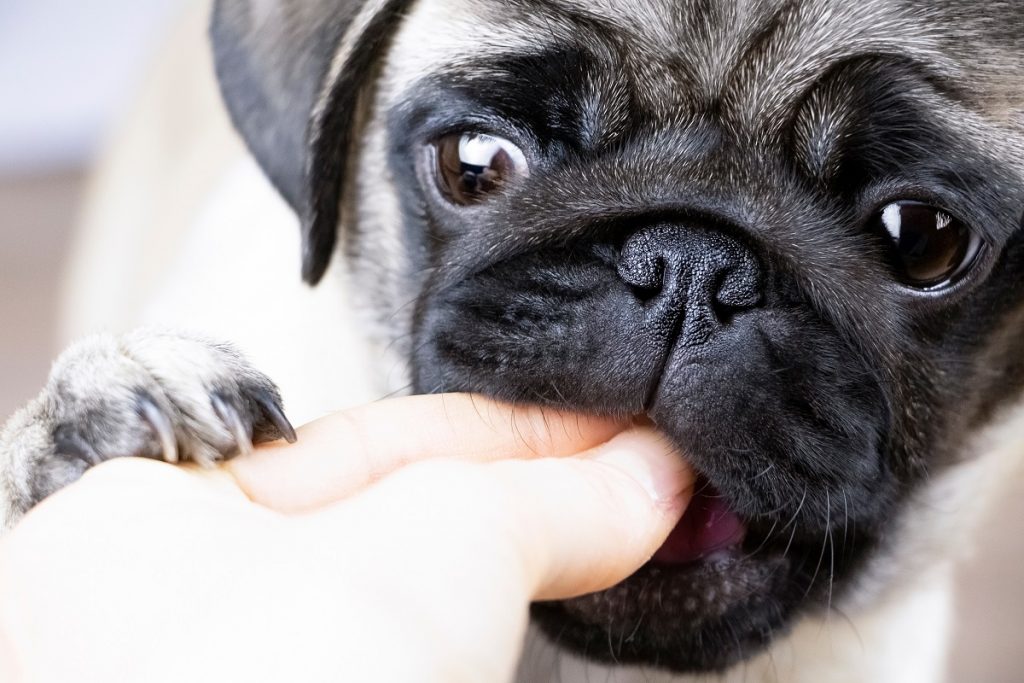- Common causes for dog nail biting are physical discomfort, allergies, anxiety, overgrown nails, and behavioral issues.
- Symptoms for recognizing nail biting are licking or chewing of the paws, redness or swelling, bleeding, infections, and changes in nail appearance and behavior.
- It’s your responsibility to monitor your dog’s behavior, and recognizing the root cause is essential for solving the problem.
- If nail biting persists or is accompanied by concerning symptoms, seeking professional advice from a veterinarian is crucial for your pet’s well-being.
- To prevent nail biting, consider behavioral therapy, regular trims, allergen testing, thunder jackets, and participation in local dog clubs.
Our furry companions sometimes exhibit behaviors that baffle even the most seasoned pet owners. One that may puzzle you is when your beloved dog bites his nails. While this might seem like a harmless quirk, understanding why dogs bite their nails is crucial for responsible pet ownership.
In this comprehensive guide, we’ll answer the question, “Why does my dog bite his nails?” and discuss the causes, symptoms, and reasons behind this unusual canine behavior. By the end, you’ll have a better grasp of why your dog might be indulging in this habit and what you can do to help.
Dog Biting Nails: Causes and Symptoms
Does the question ‘’Why does my dog bite his nails?’’ trouble your mind? Let’s look at common causes and symptoms that lead to this behavior:
Causes
Here are several reasons why your dog may be biting its nails:
Physical Discomfort or Pain
One of the primary reasons behind your dog biting his nails may be that he is going through physical discomfort or pain. Like us, dogs can be victims of various illnesses or infections affecting their paws and nails. These ailments can go from insignificant irritations to severe health issues, which may lead to nail biting.
Allergies or Skin Conditions
Allergies and dermatological conditions can also play a big role in inducing nail-biting behavior in dogs. Itchy or irritated skin can cause relentless scratching and chewing, sometimes extending to the nails.
Anxiety or Stress
Dogs are not immune to stress and anxiety. Dog biting nails anxiety can be a sign of stress or underlying issues in your pet’s life. When faced with situations that make them nervous or uncomfortable, some dogs may resort to nail biting as a coping mechanism. We can help by engaging them in dog fun activities and recreation.
Overgrown Nails

So, why do dogs chew their nails if they don’t have a skin condition or aren’t anxious or stressed? The issue might be overgrown nails. When a dog’s nails grow too long, they can become uncomfortable, making the dog more inclined to chew or bite them. Taking care of your dog’s nails is crucial, and one way you can do that is by learning to dremel dog nails.
Behavioral Issues

If you have already checked the above potential causes, but you still don’t have the answer to your question ‘’Why is my dog biting his nails?’’, consider that in some cases, nail biting can be a result of behavioral problems. Anxious, bored, or restless dogs may start with nail-biting to alleviate the unease. Fortunately, many online resources offer tips and techniques for training dogs.
Symptoms
Here’s how nail problems may manifest:
Excessive Licking or Chewing of the Paws
One of the most noticeable symptoms of nail biting is excessive licking or chewing of the paws. Your dog constantly nibbling at its paws indicates that something might be wrong.
Redness or Swelling Around the Nails
Redness or swelling around the nails is another possible sign of nail biting. This indicates that your dog’s nails and the surrounding skin have endured repeated trauma.
Bleeding or Infection
In severe cases, your dog chewing his nails can lead to bleeding or infection. When dogs chew their nails excessively, they may unintentionally damage the nail bed, causing bleeding or creating an entry point for infection.
Changes in Nail Appearance
Regularly inspecting your dog’s nails is essential. Changes in nail appearance, such as cracks or abnormalities, could indicate nail biting is taking a toll.
Behavioral Changes
Besides physical symptoms, a dog chewing nails can manifest in behavioral changes. Your dog may become irritable, withdrawn, or more anxious if they suffer from discomfort due to nail biting. Try to be patient and empathetic, and make sure you are prepared to care for dogs.
Why Does My Dog Bite His Nails?
Now that we’ve explored the question, “Why does my dog bite his nails?” and the common causes and symptoms of nail-biting in dogs, let’s delve deeper into why our canine companions engage in this behavior:
Physical Discomfort
So, do dogs bite their nails regularly? Most pet owners can’t give a straight answer to this. However, like humans, dogs may resort to nail-biting when they experience physical discomfort. Injuries or underlying health issues, such as arthritis or fungal infections, can make your dog’s paws and nails sensitive. Nail-biting becomes their way of trying to alleviate this discomfort.
Allergies and Skin Problems
Allergic reactions and skin issues are prevalent among dogs. When a dog’s skin becomes itchy or inflamed due to allergies or dermatological conditions, they may bite their nails to scratch the affected areas. This provides momentary relief but often worsens the problem.
Stress and Anxiety

Dogs are incredibly sensitive to their surroundings and can experience stress and anxiety much like humans. A dog biting their nails can be an outward expression of this emotional unrest. Scenarios like separation, fireworks, thunderstorms, or changes in routine can trigger stress-induced nail-biting.
Grooming and Hygiene
Dogs have natural grooming instincts and often lick their paws and nails as part of their grooming routine. However, excessive licking and nail biting can go beyond grooming and may indicate some of the underlying issues discussed here.
Behavioral Triggers
Sometimes, nail-biting in dogs occurs out of sheer habit or boredom. Dogs that feel lonely or lack mental and physical stimulation can develop undesirable behaviors, such as nail biting.
One of your duties as a dog owner is to notice when your dog chews nails and recognize when that might be a sign of a more serious condition that requires veterinary intervention. Persistent or worsening nail biting, accompanied by concerning symptoms like bleeding or infection, should prompt a visit to the veterinarian. They can conduct a thorough examination, diagnose any underlying issues, and suggest suitable treatment.
Bottom Line
So, why do dogs chew their toenails? Nail biting in dogs is a behavior that can arise from various causes, including physical discomfort, allergies, stress, grooming instincts, or behavioral issues. Recognizing the root cause is essential for addressing the problem effectively.
As a dog owner, you are responsible for closely monitoring your pet’s behavior. If nail biting persists or is accompanied by concerning symptoms, seeking professional advice from a veterinarian is crucial for your pet’s well-being. Timely intervention can ensure your furry friend remains healthy, happy, and free from the discomfort of nail biting.
Are you wondering, “How can I get my dog to stop chewing his nails?” If you’re experiencing this problem of your dog chewing on nails, start with regular nail trimming and provide engaging chew toys for attention redirection. Behavioral training classes can also address issues, while nutritional supplements and dietary allergen testing can help with allergies.




